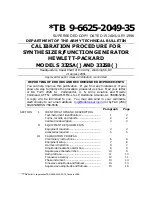
TB 9-6625-2049-35
10
(a)
SIGNAL
off (option 002 not lit).
(b)
FUNCTION
square wave.
(c)
ENTRY FREQ
.
(d)
1
MHz
.
(e)
ENTRY
AMPTD
.
(f)
1
V RMS
.
(2) Connect TI
SIGNAL
to oscilloscope
CH 1
.
(3) Set oscilloscope
CH 1
COUPLING
50
Ω
Ω
to
ON
.
(4) Set oscilloscope controls for duty cycle measurement. Duty cycle will be between
49.7 and 50.3 percent.
(5) Enter
10 VOLT
using
DATA
keys.
(6) Set oscilloscope controls for rise time measurement. Rise time will be
≤
20 ns.
(7) Repeat (6) above for fall time.
(8) Set oscilloscope controls for overshoot measurement. Overshoot will be
≤
5
percent of peak to peak amplitude (
≤
500 mV at positive and negative peaks).
(9) Perform (10) through (12) below for option 002 only.
(10) Set oscilloscope
CH 1
COUPLING
50
Ω
Ω
to
OFF
.
(11) Press TI
SIGNAL
key on (lit).
(12) Repeat technique in (6) through (8) above. Rise time and fall time will be
≤
125 ns with an overshoot <10 percent of peak amplitude (<500 mV at positive and
negative peaks).
b. Adjustments
. No adjustments can be made.
11. Ramp Retrace
a. Performance Check
(1) Connect TI
SIGNAL
to oscilloscope
CH 1
.
(2) Set oscilloscope
CH 1
COUPLING
50
Ω
Ω
to
ON
.
(3) Press keys and enter values using
DATA
keys as listed in (a)
through (f)
below:
(a)
SIGNAL
off (option 002 not lit).
(b)
FUNCTION
positive ramp.
(c)
ENTRY FREQ
.
(d)
10 kHz
.
(e)
ENTRY AMPTD
.
(f)
10 VOLT
.
































